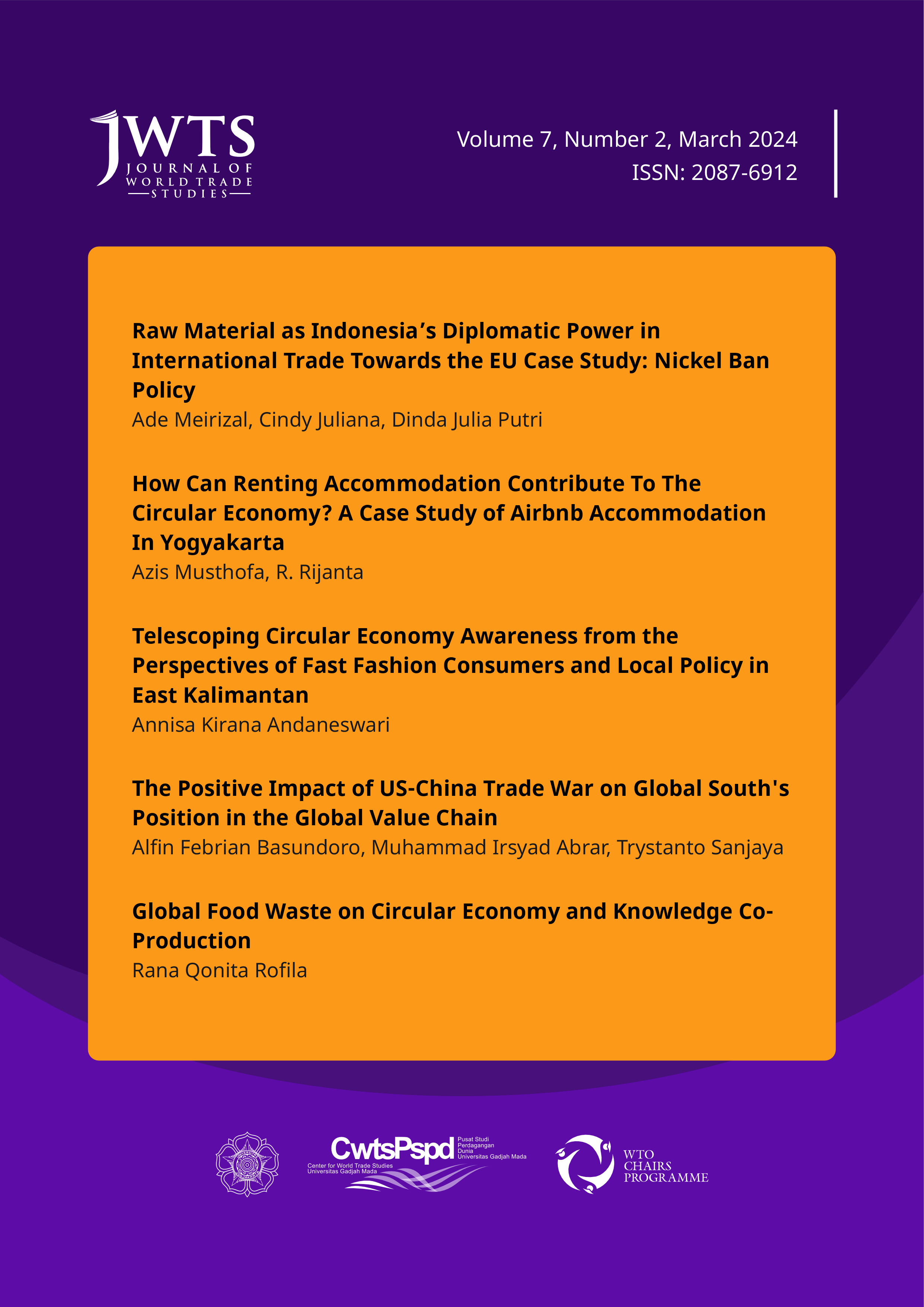Abstract
The food waste issue and the circular economy collaborate as an alternative solution for both the economy and the environment. Knowledge co-production can help to explain more about this issue. These approaches make the value of waste change into something beneficial to the economy. Many institutions, agendas, agreements, and civil movements established and caused the politics of waste to become a fruitful discourse. Transitioning to the circular economy that includes social, political, and even technological changes can be challenging or a good solution for some nations. Every actor has an important role and requires good cooperation for transitioning to the circular economy while tackling the food waste issue.
References
Barclay, E. (2013, June 6). When You Waste Food, You're Wasting Tons Of Water, Too. Diambil kembali dari NPR: https://www.npr.org/sections/thesalt/2013/06/06/189192870/when-you-waste-food-youre-wasting-tons-of-water-too
CIMSA UI. (2020, November 9). Food Waste dan Pengaruhnya terrhadap Lingkungan. Diambil kembali dari CIMSA Universitas Indonesia: https://cimsa.ui.ac.id/2020/11/09/food-waste-dan-pengaruhnya-terhadap-lingkungan/
Ellen Macarthur Foundation. (2017). Food and Circular Economy. Diambil kembali dari Ellen Macartur Foundation: https://archive.ellenmacarthurfoundation.org/explore/food-cities-the-circular-economy
Ellen MacArthur Foundation. (2021). Circular economy introduction. Diambil kembali dari Ellen MacArthur Foundation: https://ellenmacarthurfoundation.org/topics/circular-economy-introduction/glossary
Evans, D., Campbell, H., & Murcott, A. (2012). A brief pre-history of food waste and the social sciences. Sociological Review, 60(SUPPL.2), 5–26. https://doi.org/10.1111/1467-954X.12035
FAO. (2020). Food Security and Nutrition Around the World in 2020. Diambil kembali dari The State of Food Security and Nutrition Around the World in 2020: https://www.fao.org/3/ca9692en/online/ca9692en.html#chapter-1_1
FAO. (2020). Food wastage footprint & Climate Change. Diambil kembali dari Food and Agricultural Organization: http://www.fao.org/nr/sustainability/food-loss-and-waste
FAO. (2021). Food Loss and Food Waste. Diambil kembali dari Food and Agriculture Organization of the United Nations: http://www.fao.org/food-loss-and-food-waste/flw-data)
FAO. (2021). Food Loss and Food Waste. Diambil kembali dari Food and Agriculture Organization: http://www.fao.org/food-loss-and-food-waste/en/
Foodbank Australia. (2021). Food Waste Facts. Diambil kembali dari Foodbank Australia: https://www.foodbank.org.au/food-waste-facts-in-australia/?state=au
FUSION EU. (2016). Food Waste Definition. Diambil kembali dari European Union FUSION: https://www.eu-fusions.org/index.php/about-food-waste/280-food-waste-definition
Geissdoerfer, M., Savaget, P., Bocken, N. M. P., & Hultink, E. J. (2017). The Circular Economy – A new sustainability paradigm? In Journal of Cleaner Production (Vol. 143, pp. 757–768). Elsevier Ltd. https://doi.org/10.1016/j.jclepro.2016.12.048
Jasanoff, S. (n.d.). States of Knowledge: The Co-production of Science and Social Order.
Jasanoff, S. (2004). The idiom of co-production. Dalam S. Jasanoff, States of Knowledge: The co-production of science and social order (hal. 1-6). Cambridge: Roudledge.
Jurgilevich, A., Birge, T., Kentala-Lehtonen, J., Korhonen-Kurki, K., Pietikäinen, J., Saikku, L., & Schösler, H. (2016). Transition towards circular economy in the food system. Sustainability (Switzerland), 8(1), 1–14. https://doi.org/10.3390/su8010069
Lacy, P., & Rutqvist, J. (2015). Waste to Wealth: The Circular Economy Advantage. New York: Palgrave Macmillan.
Lethokunnas, T., Mattila, M., & Narvanen, E. (2020). Towards a circular economy in food consumption: Food waste reduction practices as ethical work. Journal of Consumer Culture, 1-9.
Marra, A., Mazzocchitti, M., & Sarra, A. (2018). Knowledge sharing and scientific cooperation in the design of research-based policies: The case of the circular economy. Journal of Cleaner Production, 800-812.
Osuteye, E., Ortiiz, C., Lipietz, B., Broto, V., Johnson, C., & Kombe, W. (2019, May). Knowledge co-production for urban equity. KNOW Working Paper Series No. 1, hal. 4-11.
Priestley, S. (n.d.). Food Waste. www.parliament.uk/commons-library|intranet.parliament.uk/commons-library|papers@parliament.uk|@commonslibrary
Seberini, A. (2019). Economic, social, and, environment world impacts of foof waste on society and Zero waste as a global approach to their elimination. SHS Web of Conferences (hal. 1-5). Villebon-sur-Yvette: EDP-Sciences.
Turnhout, E., Metze, T., Wyborn, C., Klenk, N., & Louder, E. (2020). The politics of co-production: participation, power, and transformation. Current Opinion in Environmental Sustainability, 15-21.
UNEP. (2014). UNEP. Diambil kembali dari Food Waste Prevwntion Guidance: https://wedocs.unep.org/bitstream/handle/20.500.11822/25194/food_waste_prevention_guidance.pdf?sequence=1&isAllowed=y
UNEP. (2021, September 7). Definition of food loss and waste. Diambil kembali dari Think Eat Save: https://www.unep.org/thinkeatsave/about/definition-food-loss-and-waste
US EPA. (2021). International Efforts on Wasted Food Recovery. Diambil kembali dari International Cooperation: https://www.epa.gov/international-cooperation/international-efforts-wasted-food-recovery

This work is licensed under a Creative Commons Attribution-NonCommercial-ShareAlike 4.0 International License.

